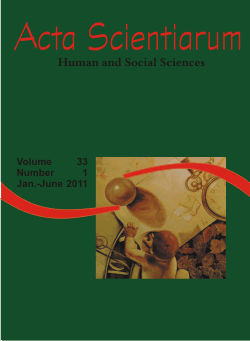<b>As falácias da ideia de progresso segundo Nietzsche</b> - doi: 10.4025/actascihumansoc.v33i1.9139
Resumo
Apresentamos as críticas de Nietzsche ao ideário moderno de “progresso”, entendido como aprimoramento da condição humana em sua perspectiva material e moral, e de que modo tal conceito se manifestou na interpretação filosófica da história e no desenvolvimento das tecnologias modernas como uma extensão da moralidade cristã. Para Nietzsche, a ideia de progresso é uma fabulação decorrente de uma má interpretação existencial da vida, pois tal conceito não representa necessariamente desenvolvimento vital e aprimoramento das forças criativas do ser humano, significando talvez o seu declínio orgânico e um distanciamento valorativo da experiência imanente da existência.Downloads
DECLARAÇÃO DE ORIGINALIDADE E DIREITOS AUTORAIS
Declaro que o presente artigo é original, não tendo sido submetido à publicação em qualquer outro periódico nacional ou internacional, quer seja em parte ou em sua totalidade.
Os direitos autorais pertencem exclusivamente aos autores. Os direitos de licenciamento utilizados pelo periódico é a licença Creative Commons Attribution 4.0 (CC BY 4.0): são permitidos o acompartilhamento (cópia e distribuição do material em qualqer meio ou formato) e adaptação (remix, transformação e criação de material a partir do conteúdo assim licenciado para quaisquer fins, inclusive comerciais.
Recomenda-se a leitura desse link para maiores informações sobre o tema: fornecimento de créditos e referências de forma correta, entre outros detalhes cruciais para uso adequado do material licenciado.

























